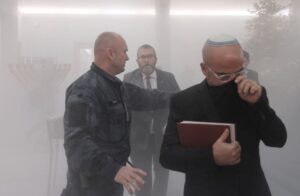Johannesburg was built on gold. It’s now such a mess that homeless people direct the traffic.
Solomon Owa’s fingers work quickly as he speaks over the hum of his sewing machine. That’s because the hum of his sewing machine might stop at any moment. “In a few minutes, the power will go,” he said.
The 51-year-old runs a tailoring business from his garage in Johannesburg. Outages leave him idle for up to 10 hours a day. Surrounded by piles of colorful material, he needs to work while he can.
It’s a rush that South Africans have begrudgingly become accustomed to as they’re forced to use more and more ingenuity to navigate daily life: Charge devices, take a shower before the hot water goes off and leave the house before the traffic lights go out. Schools, hospitals, restaurants and businesses rely on backup generators to keep running. Homeless people guide vehicles through potholed streets for cash.
The continent’s richest city was built on gold, but it’s now defined by chaos, crime and corruption more than ever. It encapsulates the wider collapse of basic services across South Africa. From a broken railway network disrupting trade to archaic sanitation that triggered a recent cholera outbreak near the capital, Pretoria, parts of the country increasingly look like a failing state.
At the heart of the dysfunction in Johannesburg is a governance crisis. Since the country’s governing national party, the African National Congress, lost control of the city in 2016, unstable coalitions have resulted in six mayors in four years. The current leader is a member of a party that holds 1% of the municipality’s 270 seats.
Services and maintenance are the most visible casualty. Then there are the rolling blackouts implemented by Eskom Holdings SOC Ltd.
The state-owned power utility, which has become a byword in recent years for South Africa’s troubles, has a fleet of coal-fired power stations that are old, poorly maintained and badly designed. The shutdowns are known locally as “loadshedding” and last for up to four and a half hours at a time.
The country still functions, but the hurdles are getting higher. “We may not be at a point in South Africa where we are a failed state, but we are certainly a failed government,” said Tessa Dooms, director of policy at Rivonia Circle, a non-profit organization whose stated aim is to transform South Africa into a “robust, sustainable democracy.”
“We don’t feel the effects of having a failed state because of other sectors of society continuing to function,” she said. “But we certainly are feeling the effects of failed governance.”
Johannesburg needed 300 billion rand ($16.3 billion) to build new infrastructure — power, water, sanitation — and make repairs, according to former Mayor Mpho Phalatse, who was voted out of office in January. The current administration plans to spend the lion’s share of its latest budget on “sustainable services” to help clear the backlog of improvements.
That’s about 60 billion rand, according to the plan unveiled on June 13 by Dada Morero, another former mayor and now an ANC member of the finance committee. “While we are cognizant of the growing backlogs, we are limited in our ability to respond due to the suppressed revenue performance in recent years,” he said.
Johannesburg became Africa’s richest city thanks to a gold rush that started in the late 19th century and continued through the apartheid era. The metropolis of more than 5 million people then became the economic dynamo of Nelson Mandela’s “Rainbow Nation” and the hope for prosperity that came with it.
Almost half of the population is unemployed and living in poverty. Nationwide, the jobless rate stands at 32.9%. Around 18 million people rely on some form of social aid, which makes the number of beneficiaries twice as many as registered taxpayers.
Meanwhile, crime has proliferated. The once flourishing central business district is an eyesore where derelict buildings are hijacked by criminal syndicates, forcing out major commercial operations from the area. For more petty criminals, in vogue are cables and metals that can be stolen from electricity substations and sold on the black market. Others just try to connect to the grid illegally.
The power cuts make the morning and evening commute an obstacle course as motorists weave around gaping holes, uncovered manholes, unattended sinkholes and exposed power cables. Seeing homeless people in groups of up to 10 control traffic when the lights go out is now a common occurrence.
Given Masiyendi, a self-appointed traffic controller, moved to Johannesburg eight years ago from his village in Venda more than 500 kilometers (310 miles) away. Things didn’t go his way and he found himself on the streets. His latest gig has proven more lucrative than begging.
In the morning, Masiyendi goes to a corner shop where the owner gives him the loadshedding schedule for the day so he can position himself by the traffic lights when they go out.
Motorists embrace the makeshift solution to keep traffic moving, given a trip that should take 15 minutes can end up being two hours. On an average day Masiyendi says he can make up to 300 rand in tips from drivers.
Officials are less happy. “Police have been the most hostile towards us,” said Masiyendi, 32. They get picked up and dumped on the outskirts of the city, he said. “Our only crime is directing traffic.”
The outages also provide the cover of darkness for more serious misdemeanor. In Roodepoort, west of Johannesburg, 12 mini local substations costing 700,000 rand each, have had to be replaced in the space of two weeks.
Residents in the suburb of Fleurhof went without power for six days after a transformer was stolen during loadshedding between 10 p.m. and 12:30 a.m. one night. Local resident Sipho Masigo, 45, said he had to rely on a small gas cylinder to heat water and barbecue what they could.
“All of our food for the month was spoilt,” he said on his street near the vandalized electricity station, eerily quiet except for the buzz of a generator coming from the only house with lights. “On day four we had to take out all the meat, braai it, eat it and give the rest away.”
City Power, which procures electricity from Eskom and distributes it in Johannesburg, reckons it lost more than 500 million rand over the past year as a result of materials damaged or stolen during loadshedding. The infrastructure is unable to cope with the surge that comes with the return of power, which damages cables and substations, prolonging darkness for days at a time.
There’s also the question of whether they can get hold of the supply in the first place. “As a business we pay around 19 billion rand to Eskom for electricity annually, but half the time we don’t get that electricity,” said City Power spokesman Isaac Mangena. “It means that we have wasted that money and we are not making any profit.”
Eskom Chairman Mpho Makwana said in an interview with Bloomberg on June 9 that a change in management structure has helped improve performance and blackouts are being reduced.
That’s probably little conciliation to Justice Ikechukwu Oparaugo. His small restaurant in the inner city has been hit by both crime and power outages.
The once lucrative business is now on its last legs because of energy insecurity. Oparaugo, 52, was forced to dismiss half his staff and move to a smaller premises, but he is still losing money. On a day last month, he had cooked 2,000 rand worth of food and sold only a fifth of that. A local gang also demanded that he pay 350 rand a week in protection money.
“In the morning I can no longer start cooking early like I used to because they take electricity,” said Oparaugo, who added that he couldn’t afford to buy a generator or switch to gas like some larger restaurants. “When you wake up, it’s not there.”
A number of business leaders have raised the alarm over the nation’s current trajectory. The central bank estimates that power cuts cost the economy 900 million rand a day and will shave two percentage points off this year’s growth rate.
In recent weeks, they met with President Cyril Ramaphosa and pledged their support in the three critical areas of energy, logistics and law and order, according to Cas Coovadia, chief executive officer of lobby group Business Unity South Africa.
For Solomon Owa, the tailor, it feels like he’s been here before. Now married with two children, he moved to South Africa 23 years ago from Nigeria’s Delta state as the country faced energy insecurity that crippled the economy.
The first sign of decay he noticed was the dirt, how he needed to polish his shoes more often, he said. Then came the rest. “What happens when the lights go out? Vandalizing starts,” he said. “My country went the same way, the same route. After some years, things fall apart. Everything is gone.”




